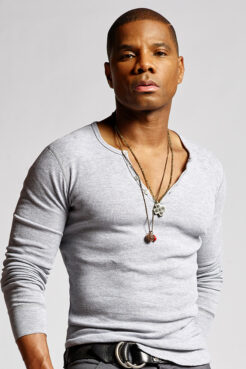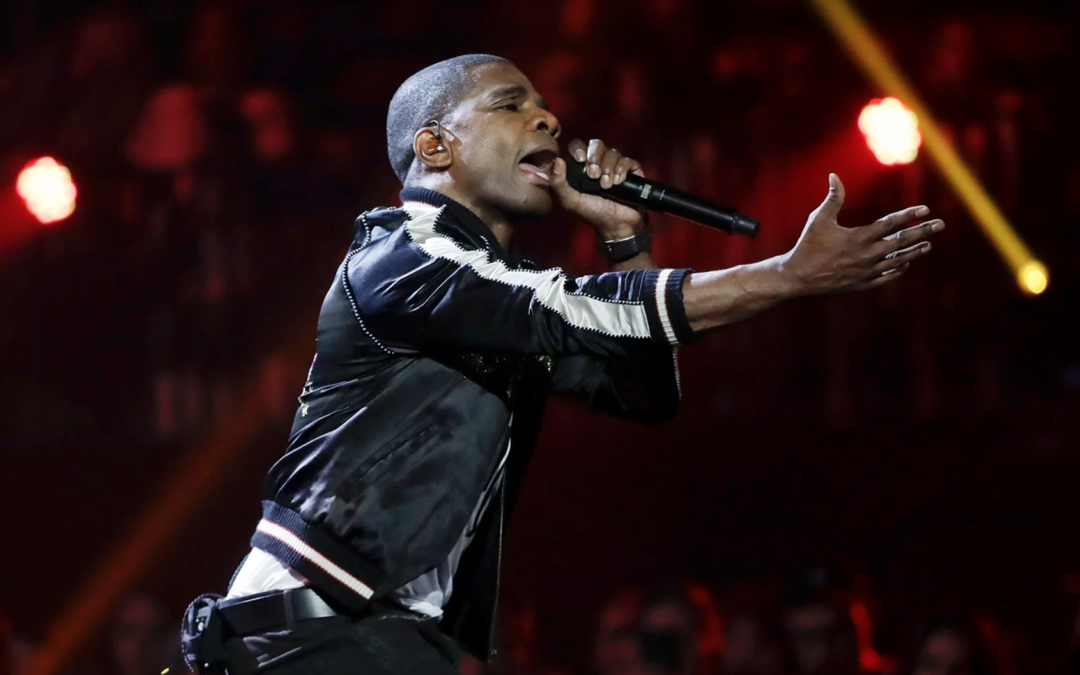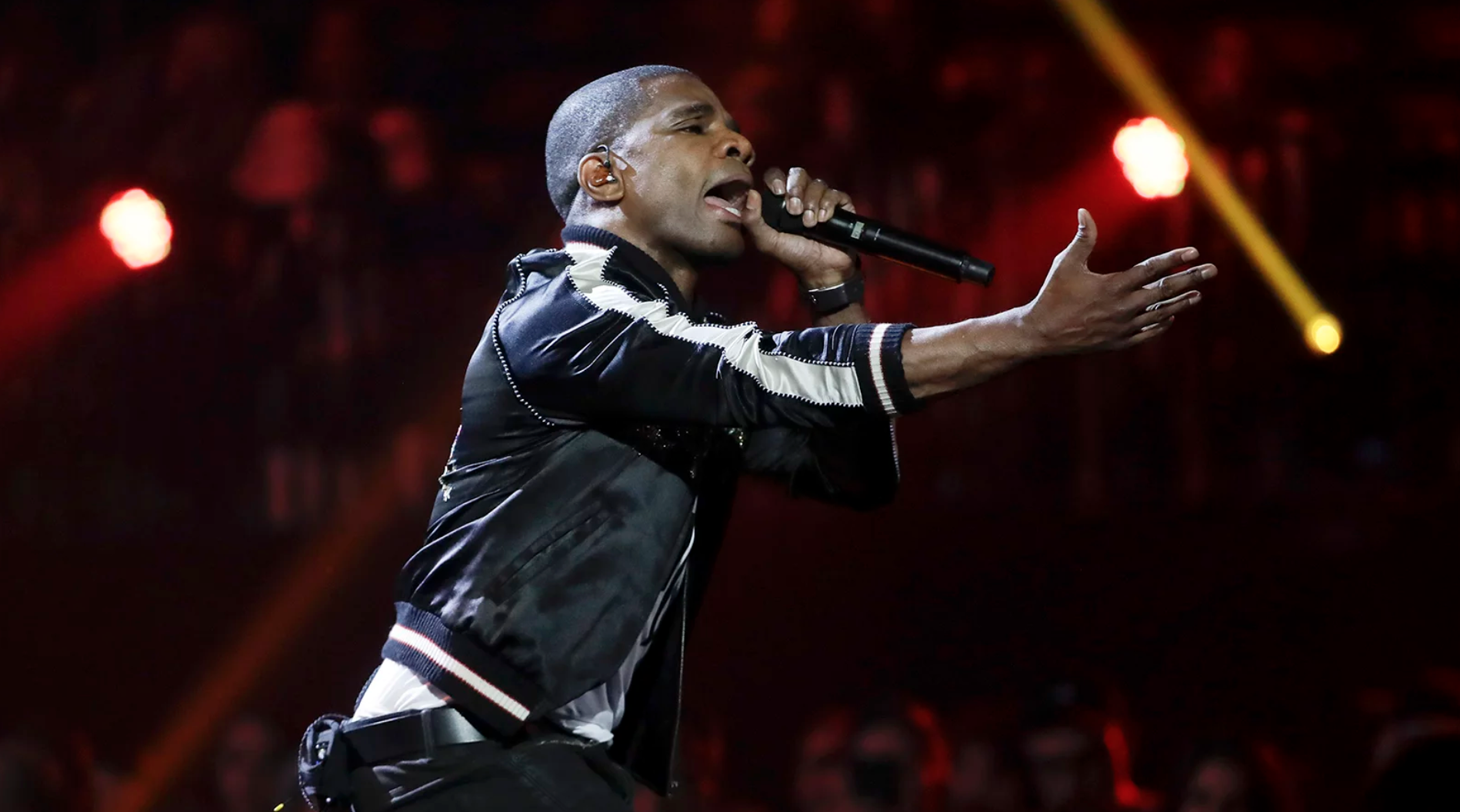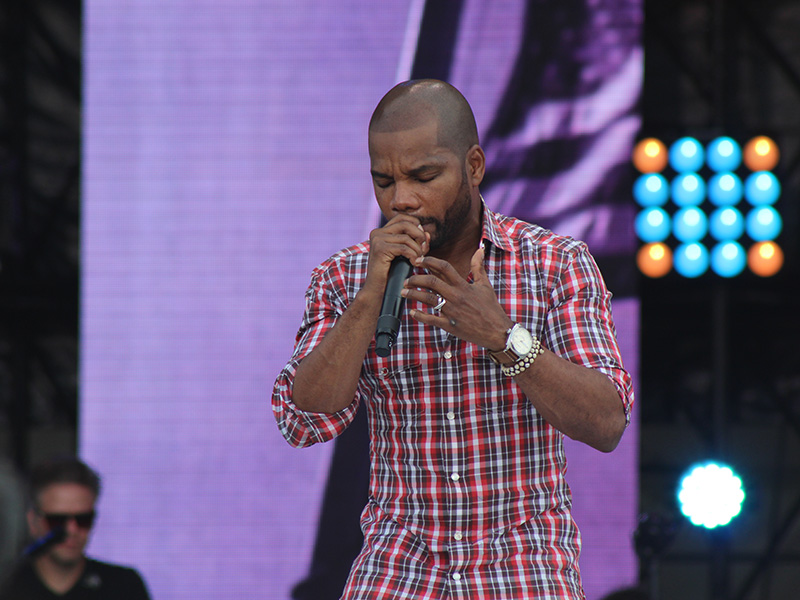Kirk Franklin explains his frustration with and decision to boycott the Dove Awards after his acceptance speech was edited to omit his portion mentioning racial injustice for the second time. (1/2) #FinalSoundcheck
( : @kirkfranklin)
: @kirkfranklin)

Courtesy of SWAY’S UNIVERSE
Grammy-winning gospel performer Kirk Franklin can’t be onstage these days but he’s featured virtually in an upcoming benefit to draw attention to poor children across the globe who are affected by COVID-19.
Franklin is joining World Vision, Food for the Hungry and Compassion International in the “Unite to Fight Poverty” virtual concert set to be televised and streamed online on Friday (Aug. 28) at 8:30 p.m. EDT on Daystar Television Network, Facebook, YouTube and PureFlix. It is also scheduled to air at 3 p.m. EDT Saturday on Fox Business.
Franklin, who won six Stellar Gospel Music Award trophies on Sunday, joins 20 other Christian artists for the two-hour fundraiser to aid the three Christian humanitarian organizations. Those groups are working to help families experiencing extreme poverty in the wake of the pandemic and natural disasters by providing hygiene supplies and clean water.
Franklin, who has traveled across the world, also recorded a new video of his song “Strong God” for Compassion to raise awareness about the crisis. Even as he’s drawing attention to the pandemic, he acknowledged it’s hard for him to not know when he’ll be able to perform in person again.
“I miss people,” said the host of the “Sunday Best” televised singing competition. “And I’m looking forward to getting back in front of people.”

Musician Kirk Franklin in 2019. Courtesy photo
Franklin, 50, talked to Religion News Service about the global effects of the coronavirus and his calls for the church to respond to racial inequities, but he declined to comment on whether his related boycott of Trinity Broadcasting Network and the Dove Awards continues.
The interview has been edited for length and clarity.
Oh, no, no, not at all. Not at all. Not at all. And I’m really appreciative and grateful for everything I get. ’Cause I know nothing is owed to me.
It’s because I believe in the ideals of what they stand for. And I know that even though there are many disparities and deficiencies in America, we are still a blessed country. I’ve been blessed to travel the globe and I can totally understand how, even in the middle of this global pandemic, there are many countries and many individuals that are not able to just pivot and to diversify to survive. I can totally see why this would be such a great moment to come together because we’ve never seen anything like this in our lifetime. And it makes me so proud of them to see them unify for the same cause.
Well, my song selection was not really based on the mood or the cause of the event. I just wanted to do music I thought would make people feel good. I performed “Love Theory” and “Just for Me.” I’ve been blessed by God’s guidance to have a whole bunch of songs and at this stage of my career, whatever I pick is going to be something that just feels good. But sometimes it’s hard to pick. And so you just deal with what you’re feeling at the moment.
Believe it or not, it was right before the world shut down. It was in January. And I was there almost a week.
How many people in the world still live marginalized lives, that still live under the poverty line, and how many people are forgotten by the 1%. That is just a mystery to me. And it can make me even, at times, question God’s bigger divine plan, even though I have to choose to believe, when it’s hard to believe. But that is something that has always fascinated me.

A recording set for the “Unite to Fight Poverty” virtual concert. Courtesy photo
We’ve had people we know, family members have died, people in the churches we’ve been members of have died or people have been hospitalized. So we’ve seen it firsthand, we’ve seen it up close. And then also I’m in the people business. And so many artists and churches and ministers and pastors, we’re in the job of touching people and there’s something very healing and therapeutic for the soul when we do. And we have not had the opportunity to do that for almost six months.
Yes, yes, of course. I’ve been very outspoken. I’ve been very engaged. I’ve been very consistent in my conversations about the disparity of how these actions are in the legal system, in the systems there to protect people, but they don’t protect all people. And also been very vocal about the lack of the church’s voice in social issues that affect people that go to these churches, that sit in these pews. And the lack of information or the lack of conversation has been really deafening.
I can just say that my heart and my passion won’t stop in any conversation I have that has to do with social injustice or the injustices of any group of people the Bible calls Christians to be engaged in. And, until we are more visible, more visual, more outspoken and more committed to these causes, I will continue to have conversations.

Musician Kirk Franklin in 2019. Courtesy photo
I will just say I will continue to have conversations until the conversations are not needed.
In October, I continue to keep the narrative of God’s heart and social injustice, and the church’s lack of engagement. We should be the ones leading the narrative and until we do, I will continue to speak up and speak loud and humble and with love until there’s tangible change.
I will be where I’m supposed to be with this message. I will be at whatever platform I’m called to be able to talk about how God’s love should include everybody. And, until that happens, I will continue to preach love, truth, justice and grace.
I started going back to therapy and that’s been very, very good for me. I’m a Black man that goes to therapy. I talk, I pray, and they are synonymous. It has been really, really good to be able to have somebody to be able to help you as you help other people. That’s something that can be very, very encouraging. For the first time in history, we had so many pandemics that were contemporaneous: You have racial pandemics, you have political pandemics, you have economic pandemics. So those things can be very daunting for someone that is looked at to be able to try to have all the answers.


Kirk Franklin performs during the Dove Awards on Tuesday, Oct. 15, 2019, in Nashville, Tenn. (AP Photo/Mark Humphrey)
Prominent gospel musician Kirk Franklin says he will boycott the Christian music Dove Awards, citing frustrations with the Gospel Music Association and Trinity Broadcasting Network for editing his past acceptance speeches to remove mentions of race and police shootings.
Franklin made the announcement on Monday (Oct. 28) in a pair of videos posted to Twitter. Speaking directly into the camera, he explained that after winning a Dove Award — which is affiliated with the GMA — in 2016, he called for racial healing during his acceptance speech, noting the shooting of both police officers and black men in general.
“When we don’t say something, we’re saying something,” Franklin said during the speech, after which he received a standing ovation and led the assembly in prayer.
In his Twitter videos, Franklin said that when the speech later aired on TBN, that section of his speech was edited out of the broadcast.
“I made my disappointment and frustration known to the Dove Awards committee and to the Trinity Broadcasting Network,” he said. “I never heard from TBN, and the Dove Awards committee promised to rectify the mistake so that it wouldn’t happen again.”
Franklin won another Dove award in 2019, when he again made mention of police shootings during his acceptance speech — this time noting the death of 28-year-old Atatiana Jefferson, who was shot by a white police officer in her own home in October, according to published reports.
During the awards ceremony held Oct. 15 — which marked the 50th anniversary of the Christian music awards — Franklin asked those in the audience and those watching to pray for both Jefferson’s family and the family of the police officer. Those remarks did not appear when the award show was broadcast on TBN a few days later.
“Again, that part of my speech was edited out,” he said.
Kirk Franklin explains his frustration with and decision to boycott the Dove Awards after his acceptance speech was edited to omit his portion mentioning racial injustice for the second time. (1/2) #FinalSoundcheck
(
: @kirkfranklin)
Franklin said that after meeting representatives from the Dove Awards committee and TBN, he has decided to boycott the awards.
“I have made the decision after prayer, consultation with my team and my pastor Dr. Tony Evans, to not attend any events affiliated with or for the Dove Awards, Gospel Music Association, or TBN until tangible plans are put in place to protect and champion diversity, especially where people of color have contributed their gifts, talents, and finances to help build the viability of these institutions.”
Franklin stressed that his ultimate goal is reconciliation, but also accountability.
“Not only did they edit my speech, they edited the African American experience,” he said.
GMA President Jackie Patillo issued a statement in response, stating that “we had to significantly edit the Dove telecast to 2 hours” and that “many were disappointed because there were so many memorable moments and noteworthy portions of acceptance speeches absent.”

Gospel artist Kirk Franklin prays during “Together 2016,” an evangelical Christian prayer rally in Washington, D.C., on July 16, 2016. RNS photo by Adelle M. Banks
Patillo also apologized, saying the GMA “would like to publicly acknowledge that we are deeply apologetic for the missteps that happened relating to the editing of Kirk Franklin’s Dove Awards acceptance speech.”
She added: “We accept the responsibility of our error. Although completely unintentional, we understand it caused great harm and deeply wounded many in the African American and Gospel community.”
Patillo said TBN has made an unedited version of the ceremony available through Video On Demand and that GMA plans to announce new “initiatives” developed after meeting with Franklin and his team.
It’s June and that means music festival season is well underway. All across the nation, music fans are clamoring for tickets to concerts and festivals to see their favorite artists in person. This year alone fans have been filling stadiums to get in “Formation,” kicking it with Drake “all summer ‘16,” or booking flights for Made in America, and many of them are self-professed Christians. Is it wrong to love God and know the words to all of Beyonce’s “Lemonade” too?
The secular music debate isn’t a new one, and it’s not going away anytime soon. I remember missing most of the ‘90s boy band craze because I grew up listening to Gospel and Contemporary Christian music.
As I’ve gotten older, it’s become more apparent that many genres of music can be beautiful and encouraging while some songs can have a negative effect on your spirit. We live in a society where some artists are “crossing over” to win a broader fan base and bring people to Christ, including Erica Campbell’s attempt at “trap gospel” with her chart-topping single “I Luh God.” However, should all secular music be off-limits?

We know from the Bible that music is an important part of our Christian walk. It’s one of the many ways we can praise and thank God for His goodness. That’s probably why there’s basically an entire book (Psalms) dedicated to praise and worship! The first verses of Psalm 150 say it best:
“Praise the Lord!…Praise him with trumpet sound; praise him with flute and harp! Praise him with tambourine and dance; praise him with strings and pipe! Praise him with sounding cymbals; praise him with loud clashing cymbals!”
The Bible speaks at length about praising the Lord with song and how the angels rejoice and sing of His goodness. The Bible also hints that not every song is good: “It is better for a man to hear the rebuke of the wise than to hear the song of fools (Ecc 7:5)”; “He put a new song in my mouth (Psalm 40:3)”; “Whoever sings songs to a heavy heart is like one who takes off a garment on a cold day, and like vinegar on soda (Prov 25:20).”
Nearly every time the Bible mentions music, it also includes the word “praise.” To praise is to express warm approval, or admiration of something, to show respect or gratitude, particularly in song.
When we sing about something, we are expressing some form of praise, and we must ask ourselves if what we are singing about is true, honest, just, pure, lovely, virtuous, and/or praiseworthy. Keep this in mind next time you’re trying to decide what songs to add to your playlist.
Remember that everything we let into our subconscious can impact our hearts toward God and our willingness to sin. It’s crucial to build strength against temptation by arming ourselves with God’s Word.
“It’s the little foxes that spoil the vine (Song of Solomon 2:15),” so what’s in our earbuds is important, regardless of genre. Here are a few perspectives from fellow Christians:

I didn’t grow up in a Christian home, and listening to secular music planted a lot of bad seeds in my heart and caused me to want to sin. Every song has a spirit attached to it and it’s a must that we guard our hearts. If you think about it, every secular song is either tempting you to have sex, giving you the urge to “turn up,” makes you want to curse someone out, kill someone, miss your ex, get sad and depressed, etc. I can’t listen to that music the minute I leave the church parking lot because it doesn’t glorify God. Personally, I have not listened to “Christian” music that [has] made a negative impact on me. I have been to several Christian concerts and when I leave I’m like “YAS! Let’s go evangelize!!!!” – Taliah, Georgia
Some of my favorite artists are Ne-Yo, Usher, Wale, J Cole, and Drake. I could [literally] write a thesis on that man. I can’t say if there’s one kind of secular music to listen to. Secular music is not for everyone. Some people desperately need gospel music or their respective spiritual jams to “shield” them from the external forces amongst us. For me, I know what feeds my spirit and what doesn’t. While I listen to majority gospel music, I have certain pockets of moments during my day when a certain album, song, or artist is needed to stimulate/relax my headspace. Not all music labeled “Christian” is good to listen to. Like anything else, everything in moderation. Music has agency. It’s an individual experience. – Myles R, Alabama
I listen to secular music because I’m a dancer and a writer; I like the sound and beats that I can dance to. I enjoy listening to current things because I like to be on top of things since I work with kids. I think music can be a form of entertainment. Who says that even praise and worship can’t be entertaining? I think the “more modern” Christian is someone who enjoys listening to secular music but still has a heart for Christ (Chance the Rapper’s “Coloring Book” is a good example). I consider things like the music and the message, so I don’t listen to everything. It is a constant battle between feeding our flesh and our Spirit, but if music isn’t something you struggle with, then I see no harm in listening to it. Everyone has different convictions. – Faith L., Chicago
Some secular music is really good, like songs about social issues, love, and politics. Even though the song may not be explicitly religious, if done in excellence and not vulgar, it can be quite enjoyable, even edifying. Secular music wasn’t allowed when I grew up, and although I hated it, it made sense. Back then, I just liked the beat. Some lyrics made me wince but were rarely enough to stop listening. There is music labeled Christian or Gospel that has nothing to do with Christ– it glorifies man and his desires, treating God as the means to acquire blessings & breakthroughs instead of worshipping. It’s not good to call it “Gospel” when the purpose is to entertain. The minute you attach Christ or The Gospel, the expectations of your music changes. Also, telling someone “Don’t smoke, don’t drink and don’t chase after wealth and fame” is great, but unless the context is turning from sin and honoring God, He gets no glory. When a gospel artist makes the switch to secular or what many call “good art” it’s not wrong, but it bothers me because I see it as a lesser choice. – Andwele W., Marketing Director for P4CM (The Passion for Christ Movement)
It’s clear there are different views on what role music plays in our lives and how it aligns with our faith. There are artists like Trip Lee who use contemporary, mainstream musical techniques to glorify God and more traditional artists that stick to the Gospel genre like the Winans. While there are others, such as Tori Kelly, who maintain their musical career while striving to live in God’s image, and, of course, the secular artists, such as the Black Eyed Peas, who make beautiful songs like “Where is the Love?”
The important thing is to constantly evaluate what we allow into our mental space, guard our hearts, and ask the Lord to keep our thoughts pure.
Let us know what you think about the topic and what artists you’re listening to this summer.
 The 58th Grammy Awards were everything we expected filled with great music, interesting acceptance speeches (Taylor, we’re looking at you.), and phenomenal live performances. And in case you missed it, here’s a recap on which of your favorite gospel artists walked away with the highest honors during music’s biggest night of the year.
The 58th Grammy Awards were everything we expected filled with great music, interesting acceptance speeches (Taylor, we’re looking at you.), and phenomenal live performances. And in case you missed it, here’s a recap on which of your favorite gospel artists walked away with the highest honors during music’s biggest night of the year.
“Destined to Win [Live],” Karen Clark Sheard
“Living It,” Dorinda Clark-Cole
“One Place Live,” Tasha Cobbs
“Covered: Alive in Asia [Live] (Deluxe),” Israel & Newbreed- WINNER
“Life Music: Stage Two,” Jonathan McReynolds
“Worth [Live],” Anthony Brown and Group Therapy
“Wanna Be Happy?,” Kirk Franklin- WINNER
“Intentional,” Travis Greene
“How Awesome Is Our God [Live],” Israel and Newbreed featuring Yolanda Adams; Neville Diedericks, Israel Houghton and Meleasa Houghton, songwriters
“Worth Fighting For [Live],” Brian Courtney Wilson; Aaron Lindsey and Brian Courtney Wilson, songwriters
“Whatever the Road,” Jason Crabb
“How Can It Be,” Lauren Daigle
“Saints and Sinners,” Matt Maher
“This Is Not a Test,” Tobymac- WINNER
“Love Ran Red,” Chris Tomlin
“Holy Spirit,” Francesca Battistelli- WINNER
“Lift Your Head Weary Sinner (Chains),” Crowder; Ed Cash, David Crowder and Seth Philpott, songwriters
“Because He Lives (Amen),” Matt Maher
“Soul on Fire,” Third Day featuring All Sons & Daughters; Tai Anderson, Brenton Brown, David Carr, Mark Lee, Matt Maher and Mac Powell, songwriters
“Feel It,” Tobymac featuring Mr. Talkbox; Cary Barlowe, David Arthur Garcia and Toby McKeehan, songwriters
“Still Rockin’ My Soul,” the Fairfield Four- WINNER
“Pray Now,” Karen Peck and New River
“Directions Home (Songs We Love, Songs You Know),” Point of Grace

A LONG TRAIL OF RUFFLED FEATHERS: In March, New York University students demonstrated against the Chick-fil-A company and the donations it gives to conservative organizations opposed to gay marriage. (Photo: Richard B. Levine/Newscom)
What in the world? What’s going on when in the home of the free a person can’t be brave enough to express their opinion without someone calling for a chicken boycott?
Personally, I don’t like chicken much anyway. I think it’s because my wife cooks it with just about every meal. But, before I talk myself out of supper, let me quickly add that she cooks chicken very well — much better than Chick-fil-A. Still, many people around the country still give Chick-fil-A a first-place ribbon when it comes to fast fowl.
Chick-fil-A’s owners are known for espousing strong Christian values (you can’t get the stuff on Sundays), but now that the company’s COO, Dan Cathy, has restated his well-known opinion regarding same-sex marriage, folks want to chop the company’s gizzards?
People suddenly have something against good fast food chicken (if there is such a thing). No apparent qualms with greasy spoons KFC, or Church’s Chicken, or Bojangles or even Popeye’s. All because some rigid people (and politicians who are often on the lookout for a situation to pimp for votes) believe that Cathy has offended a certain American minority group — the LGBT community.
The black community, which has a long history with and reverence for the proper use of boycotts, ought to be pecking mad about this.
Black folks know all too well about chicken and stereotyping. Still, black folks haven’t cried boycott over being branded lovers of watermelon and “finger lickin’ good” chicken made by “de good ole” antebellum KFC colonel. Black folks didn’t cry boycott over the blatant marketing ploy of gospel singer Kirk Franklin praisin’ and dancin’ for Church’s Chicken or some of Church’s other questionable ads. And do I even have to mention Bojangles Chicken ‘n’ Biscuits? More recently, we blasted hip-hop soul icon Mary J. Blige but then quickly forgave her for singing on a table about Burger King’s new Crispy Chicken Wrap. No BK boycott. And Lord knows if we haven’t yet called for an all-out boycott over Popeye’s “Annie the Chicken Queen,” (some have dubbed her a modern-day mammy), then no one should be calling for one against Chick-fil-A’s stance in favor of traditional marriage.
Besides, perhaps a sign that you’ve grown up as a minority group in America is when your feathers are no longer ruffled by every perceived slight.
Americans, including some members of the LGBT community, who have not joined in the boycott cackling, are displaying common sense. They understand that freedom of speech is a sacred right. Shutting down one person’s free speech (even when we don’t like what they say or believe) puts ALL of us at risk. It also stifles much needed honest dialogue that could lead to understanding, mutual respect and coexistence. The politicians claiming they will block Chick-fil-A from opening stores in their cities know that they are selling wolf tickets with extra sauce. They have no legal basis to do so and their cities would be sued, costing taxpayers millions. Besides, people need jobs and cities need tax revenue.
A boycott is a serious weapon that should be reserved for challenging Constitutional offenses like employment, healthcare, or voter discrimination. Or hate crimes where people were beaten, gunned down, or hung from trees. Or when a child of God feels so bullied and humiliated that he commits suicide.
Cathy’s comments are far away from this coop.
His public relations team mishandled the news and social media onslaught his comments triggered (a fake Facebook account to cover your tracks against the Muppets? C’mon now, people). The error was compounded by the sad sudden death of Don Perry, Chick-fil-A’s longtime vice president of public relations.
Cathy simply offered his personal Bible-based opinion that marriage should be between a man and woman. As long as Chick-fil-A does not discriminate against gays and lesbians in anyway, there’s nothing legally wrong with a businessman sharing his opinion. (A wise business move? Well, that’s another story).
If Chick-fil-A ever does in fact discriminate, the company should be condemned because it would not only be in violation of federal law but in betrayal of the Christian Beatitudes it espouses. In that case, I would be the first to say “no thanks” if my wife ever suggested we hit the Chick-fil-A drive-thru for dinner.